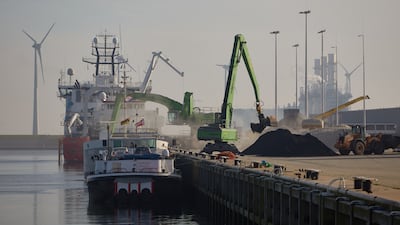Bills will be high, but Europe will survive the winter: it’s bought enough oil and gas to get through the cold seasons.
Much deeper costs will be borne by the world’s poorest countries, which have been shut out of the natural gas market by Europe’s suddenly ravenous demand. It’s left emerging market countries unable to meet today’s needs or tomorrow’s, and the most likely consequences — factory shutdowns, more frequent and longer-lasting power shortages, the foment of social unrest — could stretch into the next decade.
“Energy security concerns in Europe are driving energy poverty in the emerging world,” said Saul Kavonic, an energy analyst at Credit Suisse Group AG. “Europe is sucking gas away from other countries whatever the cost.”
After a summer of rolling blackouts and political turmoil, cooler weather and heavy rains have alleviated the immediate energy crisis in Pakistan, India, Bangladesh and the Philippines. But any relief promises to be temporary.
Colder temperatures are on the way — parts of South Asia can be more bitter than London — and the chances of securing long-term supplies are slim. The strong US dollar has only complicated the situation, forcing nations to choose between buying fuel and making debt payments. Under the circumstances, global fuel suppliers are increasingly wary of selling to countries that could be heading for default.
The center of the issue is Europe’s response to tightening fuel supplies and the war in Ukraine. Cut off from Russian gas, European countries have turned to the spot market, where energy that isn’t committed to buyers is made available for short-notice delivery. With prices soaring, some suppliers to South Asia have simply cancelled long-scheduled deliveries in favour of better yields elsewhere, traders say.
“Suppliers don’t need to focus on securing their LNG to low affordability markets,” Raghav Mathur, an analyst at Wood Mackenzie said. The higher prices they can get on the spot market more than make up for whatever penalties they might pay for shirking planned shipments. And that dynamic is likely to hold for years, Mathur says.
Damage caused by global warming, such as the devastating floods in Pakistan, is also wreaking economic havoc on emerging nations, prompting leaders at UN climate talks in Egypt this month to discuss how richer countries can help provide more support.
At the same time, Europe is speeding up construction of floating import terminals to bring in more fuel in the future. Germany, Italy and Finland have secured the plants. The Netherlands started importing LNG from new floating terminals in September. European demand for natural gas is expected to surge by nearly 60 per cent through 2026, according to BloombergNEF.
Exporters in Qatar and the United States are now entertaining bids from European importers looking to buy fuel to fill the new capacity. For the first time, emerging nations like Pakistan, Bangladesh and Thailand are forced to compete on price with Germany and other economies several times their size.
“We are borrowing other people’s energy supplies,” said Vitol group chief executive Russell Hardy. “It’s not a great thing.”
Usually, when there’s a short-term shortage, nations can sign long-term supply contracts, paying a fixed rate for the assurance of reliable deliveries for years. That hasn’t worked this time. Even bids for deliveries starting years into the future are being rejected.
India failed in its latest attempt to lock in shipments starting in 2025. Bangladesh and Thailand essentially abandoned efforts to get contracts that start before 2026, when massive new export plants in Qatar and the US plan to start shipping fuel. Pakistan last month was unable to close a six-year deal that would have started next year, after several attempts at short-term purchases also failed.
“We’d thought the crisis would be over by the end of the year, but it isn’t,” said Kulit Sombatsiri, permanent secretary of Thailand’s energy ministry, at a briefing on Monday. If LNG prices continue to rise, he added, the government would have to consider measures such as closing down convenience stores and other high-energy businesses.
LNG suppliers fear that these nations won’t be able to pay for promised deliveries. Fuel is priced in US dollars, and a single shipment currently costs nearly $100 million. For comparison, LNG shipments averaged $33 million during the 2010s. And costs are higher still in domestic currencies because the dollar has been rapidly appreciating, adding to pressure on the countries' beleaguered finances.
Without Russian gas flowing into Europe, the global gas markets will stay tight. Spot prices will remain high, and without the ability to secure long-term supplies, developing countries may look to dirtier fuels or other partners.
The momentum behind natural gas growth in developing economies has slowed, notably in South and Southeast Asia, putting a dent in the credentials of gas as a transition fuel, the International Energy Agency said in its World Energy Outlook 2022. Natural gas is the cleanest burning fossil fuel and emits less CO2 than coal when combusted.
The energy shortage has already brought the emerging world and Russia closer together. Russia’s been more than happy to offer fuel to Pakistan, India and others who’ve been shut out of the spot market.

